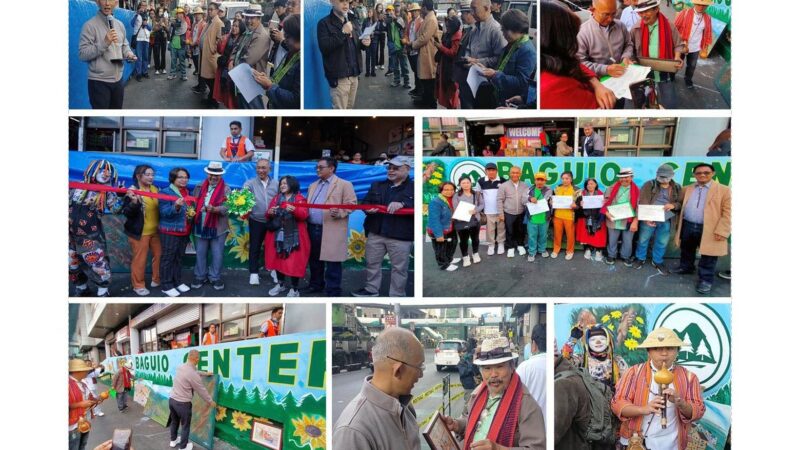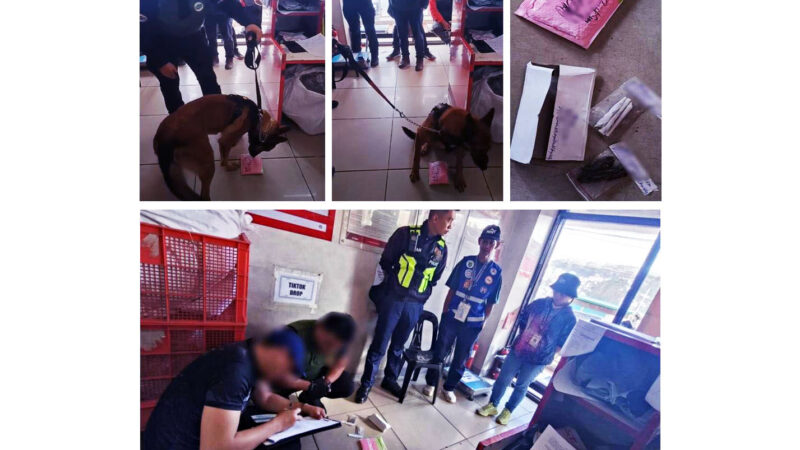City reorganizes anti-illegal structures committee

The city government will be implementing a simplified procedure in dealing with illegal structures and squatting activities beginning July 24, 2023.
This was based on an executive order by Mayor Benjamin B. Magalong reorganizing the current Anti-Squatting and Anti-illegal Structures Committee, and renaming it as the City Anti-Illegal Structures Committee (CAISC), further restructuring its functions, procedures, and guidelines and in effect revokes Executive Order No. 51, Series of 2020.
The CAISC will be composed of 13 members led by the mayor as chairperson and City Building Official Ar. Johnny Degay as vice-chairperson. Members of the CAISC are management executives from the following departments: City Legal Office, City Engineering Office, City Environment and Parks Management Office; City Social and Welfare Development Office, Baguio City Police Office; two from the City Mayor’s Office’s executive staff and Public Order and Safety Division.
Provisional members of the CAISC are: City Assessor’s Office; City Planning, Development & Sustainability Office; Baguio City Market Authority; and, City Health Office.
The secretariat shall be headed by the CBAO, and its members shall be designated from the City Mayor’s Office and the City Legal Office. In the absence of the Chairperson and Vice-Chairperson, the City Legal Officer, shall preside.
The CAISC shall adopt necessary measures to effectively curtail the proliferation of illegal structures, and squatting activities; undertake investigation of complaints of unlawful occupation of land, and building of structures done in violation the National Building Code; monitor eviction and demolition activities, and establish its own monitoring system; through resolution, recommend the issuance of Demolition Orders for illegal structures to the City Mayor; and, perform any other lawful function necessary, or incidental, to its mandate.
Particularly, the CBAO shall constitute its own Inspection and Investigation Team to undertake inspection and investigation on the complaints received relative to illegal structures and squatting. The Investigation team shall abide by its established rules of procedure in the conduct of their investigations; determine the technical aspect of the structures and such other matters as it may deem fit and necessary to aid the Committee in arriving at a just resolution of the complaint filed; issue Notices of Violation and Cease and Desist Order/s for the respondent/s to stop their construction works; monitor compliance with the Notices & Orders issue; execute affidavit-complaints for the filing of a charge for violation of the National Building Code against the builder, if any; and such other duties and functions as provided under the National Building Code, and as may be assigned to it as the need arises.
The BCPO on the other hand shall provide security during the conduct and/or implementation of Demolition Orders; perform such other duties and functions as may be assigned from time to time by the City Mayor relative to the implementation of this Executive Order.
Meantime, the CMO-POSD shall be responsible for the service of Notices of Deliberations and such other papers and documents necessary in the conduct of the functions of the Committee; provide security and/or be responsible in maintaining peace and order during the committee deliberations and meetings; and such other duties and functions as may be assigned to it in relation to the functions of the Committee.
Per the EO, the CAISC shall have jurisdiction over complaints for demolition of illegal structures/construction found on unregistered land, except: properties where a CALT, CALC, or CADT has been issued or is the subject of a pending application heard before the NCIP in relation to Republic Act No. 8371; where the parties allege disputing claims in relation to boundary, ownership, and possession; or where the property is subject of a pending civil, administrative, or criminal action, and such action alleges disputes of boundary, ownership, and possession; where the property is subject of a Miscellaneous Sales Application, Residential Free Patent Application, or Townsite Sales Application. In such case, the structure owner must submit an Undertaking to secure a Building permit within a period as recommended by the City Building Official;
The CAISC shall also have jurisdiction over complaints for demolition of illegal structures found within Titled Property, except: title to property issued is a CALT, CALC, or CADT in accordance with Republic Act No. 8371; where the parties allege disputing claims in relation to boundary, ownership, and possession; or where the property is subject of a pending civil, administrative, or criminal action, and such action alleges disputes of boundary, ownership, and possession; within Road-Right-of-Way; public places, City/Barangay Roads, Danger Areas; Forest Reservations and Greenbelt Areas; Watersheds; Esteros and Waterways; and other lands imbued with public interest such as, but not limited to lands used for national defense and security of the State; Lands used, reserved, or otherwise set aside for government offices, facilities, and other projects, whether owned by the National Government, its agencies and other instrumentalities, including government-owned or –controlled corporations, or by the Local Government Unit; Lands used or set aside for parks, reserves for flora and fauna, forests and watersheds, and other areas necessary to maintain ecological balance or environmental protection as stated in Statute or Law; those actually and primarily used for religious, charitable, or educational purposes, cultural and historical sites, hospitals and health centers, and cemeteries of memorial parks; Government Reservations/State-owned properties and other inalienable lands; areas identified for Government projects; areas identified for City/Barangay needs; and against structures of those found to be professional squatters as determined by the appropriate agency, office, or body.
In cases not falling within the area of jurisdiction, the same shall be dismissed immediately without need of forwarding to the CAISC. Dismissal of cases shall be without prejudice to the imposition of administrative fines, and criminal actions under pertinent laws and/or ordinances when warranted. Plaintiffs/Complainants shall be advised at the earliest opportunity to seek redress with the appropriate court, office, or tribunal having proper and competent jurisdiction.
Construction/structures found within National Roads/Highways and/or their corresponding Road-Rights-of-Way shall be subject to demolition, in coordination with the Department of Public Works and Highways.
Meanwhile, for structures that are considered ruinous, as defined under the National Building Code and its Implementing Rules and Regulations, the same shall no longer be referred to the CAISC. CBAO shall take action over the same, according to procedures set forth in the National Building Code, and all related laws.
All complaints for demolition of alleged illegal construction/structures shall be filed with the CBAO only. An investigation will follow and the CAISC shall issue a Notice to the concerned parties, directing them to submit a Position Paper not later than ten (10) days from their receipt of said Notice.
The CAISC shall then conduct deliberations and other appropriate actions on complaints against illegal structures, and pertinent matters brought under its cognizance followed by the issuance of the Demolition Order or the Dismissal of the Case.
All Notices of Demolition shall be signed and issued by the Presiding Officer all Demolition Orders shall be signed by the City Mayor, or his representative duly authorized by Executive Order only.
The City Demolition Team, under the CBAO shall take charge of executing and implementing demolition orders; the owner of the property subject of the Demolition Order shall be duly notified by being furnished with a copy of the Notice of Demolition indicating therein the date when the demolition shall be undertaken, and attaching thereto a copy of the Demolition Order.
The implementation of the Demolition Order shall be in coordination with the BCPO, specifically the police station at or nearest to the barangay where the demolition will be undertaken, as well as the Punong Barangay concerned.
In the implementation of the Demolition Order, the following safeguards must be complied with: Proper identification of all persons taking part in the demolition; Execution of demolition only during regular office hours from Mondays to Fridays except during inclement weather and disasters, unless the affected parties consent otherwise; No use of heavy equipment for demolition except for structures that are permanent and made of concrete; Proper uniforms for members of the Philippine National Police who should occupy the first line of law enforcement and observe proper disturbance control procedures.
Pursuant to City Ordinance No. 39, series of 1991, in instances where a structure has already been demolished due to a demolition order and is subsequently rebuilt, the same shall be referred for validation by the CBAO. Upon finding that an illegal structure has indeed been rebuilt, it shall be immediately demolished without need of referral to the Committee nor issuance of another Demolition Order.
Within ten (10) days from receipt of both the Notice of Demolition and Demolition Order, the aggrieved party may file a Motion for Reconsideration, addressed to the Committee, which shall include all arguments, discussions, pertinent documents and evidence. Only one (1) Motion for Reconsideration shall be allowed. Subsequent Motions for Reconsideration shall be automatically deemed denied.
For Summary Demolition, the City Mayor himself, or by recommendation of CBAO, may order the summary demolition of structures found to be within lands that are: those actually used for national defense and security of the State; those used, reserved or otherwise set aside for government offices, facilities and other installations, whether owned by the national government, its agencies and instrumentalities, including government-owned or -controlled corporations, or by the local government unit; those used or set aside for parks, reserves for flora and fauna, forests and watersheds, and other areas necessary to maintain ecological balance or environmental protection, as determined and certified to by the proper government agency; those actually and primarily used for religious, charitable, or educational purposes, cultural and historical sites, hospitals and health centers, and cemeteries or memorial parks; Government Reservations/State owned properties and other inalienable lands; greenbelt areas; danger areas; City/Barangay Roads and their corresponding Road-Rights-of-Way; National Road-Right-of-Way, in coordination with DPWH; areas identified for Government projects; areas identified for City/Barangay Needs; other areas of similar nature; and against structures of those found to be professional squatters as determined by the appropriate agency, office, or body.
For cases subject to summary demolition, the Notice of Demolition may be issued immediately. – JMPS







